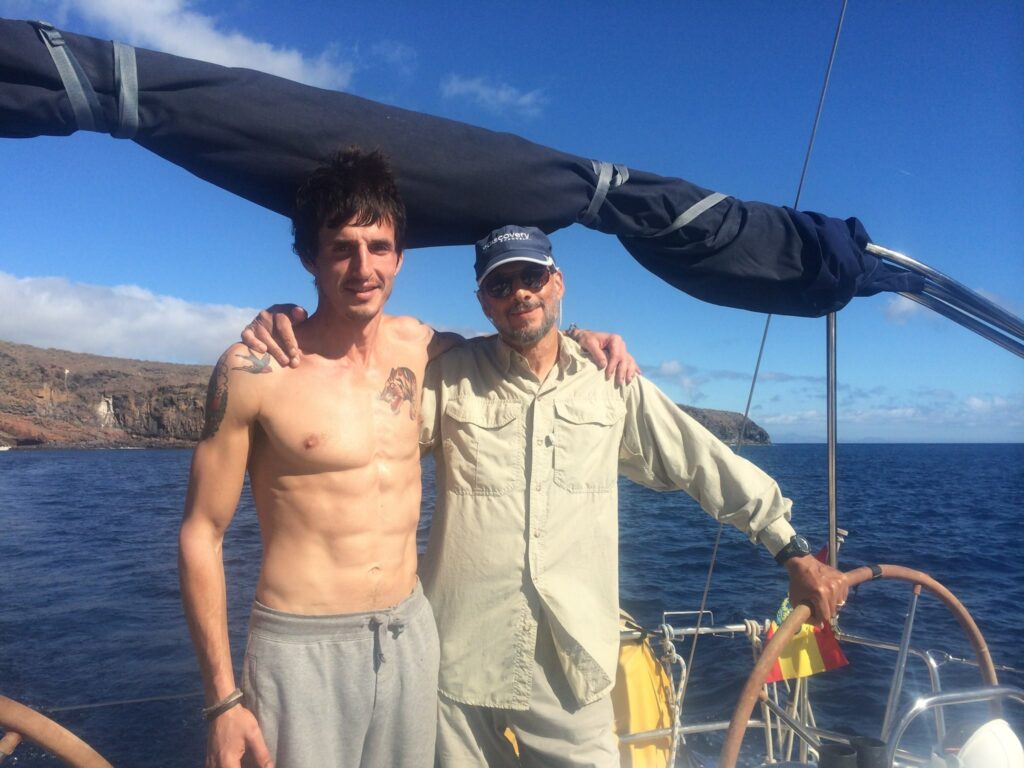Days. Doldrum days. Underway. At anchor. Alongside. Slow loads and slow unloads. Day workers day work and watchkeepers keep watch.
There are days when the belly of time swells with idle hours only for it to rip wide open like the crotch seam of a fat mans jeans and then the minutes and seconds rush past as salmon in a swift moving stream.
‘Boring is for the boring’ my mother always said, and with such an admonition in mind I occupy myself as best I can. I read. I watch TV. I run out on deck or on the treadmill. I do hundreds and hundreds of pushups. I eat. I sleep. But there are times when I find myself sitting in my cabin and staring blankly at the wall.
We’re on the final stretch.
The port is near, the bells I hear…
One more month, give or take, and the season will be through. This is my 144th day at sea this year. It is cold now. Numb fingers and toes. Lips chap. Tempers fray. Getting ready for watch I don layer after layer. Armour against the elements. Out on deck I waddle, encumbered as I am by my winter gear.
On my last trans-Atlantic voyage I came up on deck for watch at 0800. We were 24 days into what would end up being a 32-day transit from Bermuda to Brest, France. At that moment I stared out at mile upon mile of desolation. ‘Trackless waste’ I heard one skipper describe the endless ocean. I felt a rising panic within me, starting in my toes and rushing up to my head as though it might blow clean off. Something akin to what agoraphobics must experience but it was a feeling of being unable to escape. It lasted only a moment. I told myself I would never do a trip like this again and yet, here I was, sailing on a hundred-year-old three-masted Barque. A world wonder of rigging and sail. An opportunity few can imagine let alone realize. It didn’t help that the first week of the sail had been an adrenaline overload as we were slammed with hurricane force winds and industrial-sized waves, and had to work furiously to keep the ship form peril.
Around that time I worked on a movie about the tragedy of the whaleship Essex, sunk by an enraged sperm whale in the furthest reaches of the Pacific in 1820. Steve Callahan had been brought on board as a consultant and we became friends. He had spent 76 days alone, adrift in a life raft on the Atlantic after his small sailing boat was sunk, also by a whale strike. He wrote a bestseller about it called ‘Adrift’. He knew too well how slow time can pass. How the minutes become oleaginous. The seconds ooze. Add to that slow starvation, sleep deprivation and fighting to keep your failing inflatable raft inflated. He was there to give us, the cast playing the crew of the Essex, a senseof what that time might feel like. Afloat on a massive sea in a small craft. He spoke of how his mind began to fray as his body slowly consumed itself, something that also happened to thecrew of the Essex, as reported in the scant firsthand accounts(there were few survivors). When I begin to beweep my outcast state and the days start to grate on me, I need only think of Steve and those ill-fated whalers of the Essex.
Me and some of the cast went sailing with Steve on a 40-footyacht in La Gomera where we were filming. Steve has a slight frame, at the time weakened by a bout with leukemia. We were all viciously hungover from a party the night before, all except for Steve and his wife Kathy. He was not a well manyet to see him behind the wheel was to see him come alive. He seemed to double in size. Become an extension of the boat.
We sailed ten miles out into the wind on the open Atlantic withthe vessel heeled over smartly until the mountains of the Canary Islands were barely visible, and then we tacked and ran briskly back before the breeze. The only time Steve left the helm was to instruct someone on it. It was where he wanted to be.
‘It’s been a while,’ he said.
When we returned he deftly navigated the dizzying minefield of mooring balls and yachts at anchor in the small harbour, spun around somehow in the tiny space there was, and deposited me on the pier so I could collect a zodiac to come and pick them all up from the mooring.
In a piece of extraordinary irony the yacht rental company would not recognize Steve’s nautical accreditations, him, a world-famous sailor. We rented the boat on my license.
As with any great love, romance can fade.
One can only see so many sunsets and sunrises before they lose their luster.
One can only climb so many ship’s rigs before becoming inured to the experience.
A while back I sailed on a school ship. We were in the middle of the Atlantic when a pod of a hundred or more dolphins burst from the spume off our port quarter, their bodies, exquisite commas punctuating the never-ending lines of trough and swell. The teenagers on deck all gasped and shrieked and called their friends up from below. They gathered on the rail, snapping pictures and smiling ecstatically. I was with the 2nd mate, an old friend of mine, standing by the wheel. One of the students asked him breathlessly,
‘But Jason! Aren’t you going to look at the dolphins?’
‘I’m not going to waste the energy turning my head,’ he kept his gaze fixed on the distant horizon and drew deeply on his cigarette.
‘Fuckin’ squirrels of the sea,’ he said.
